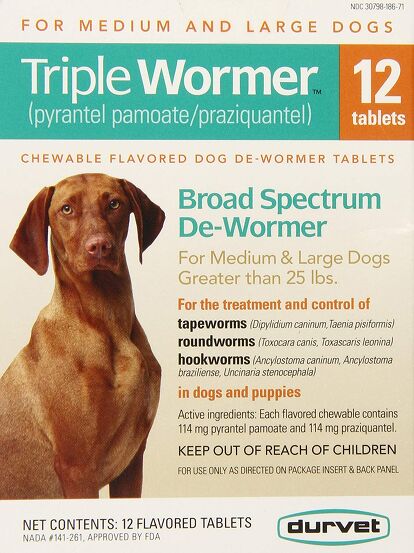Best Dog Dewormers

Dog dewormers keep your pet free of dangerous internal parasites–and make sure they are not at risk for serious health issues. Check which dewormers are the best and learn when and how to properly use them.
It’s not always easy being a pet parent–properly caring for a dog requires effort and dedication. There are plenty of responsibilities that come with a pooch, and one of them is making sure that they are healthy and have a good quality of life. Like with humans, the key to this is prevention. This can include various things, from meeting their needs for physical exercise to ensuring they have a well-balanced diet that offers all of the essential nutrients- setting up a solid foundation when it comes to your pet’s health will pay off in the long run. Of course, there are also those responsibilities that not many think about in time–such as making sure that your pet is free of pesky internal parasites.
How can dogs get parasites?
Unfortunately, internal parasites are a common occurrence for our canine companions. The list of the parasites that love dogs as hosts includes worms (roundworms, whipworms, hookworms, and tapeworms) and protozoa (giardia and coccidia). It’s easy for a dog to contract parasites, as they can get them from fleas, from contaminated water, by eating another dog or cat’s poop (disgusting, but many dogs do that), and in various other ways. Puppies can even get parasites directly from their mom. And that’s not all–your dog can infect you with worms, mostly through contact with their feces.
What symptoms do dogs have when they are infected with parasites?
When infested with worms, dogs can experience a range of health issues as a result. From vomiting and diarrhea to anemia and malnutrition, worms in dogs can cause a world of trouble for your pooch and seriously compromise their immune system. Needless to say, you’d want to make sure your dog is free of any kind of parasite, and for internal parasites, you’ll have to regularly administer dog dewormers.
Dog dewormers are OTC anti-parasitics that efficiently eliminate existing parasites in all life stages and, when administered in regular intervals, prevent repeat infestation. There are different types of dog dewormers with different spectrums of effectiveness (not all dewormers target every type of parasite). To make sure your pet is free of those nasty intruders in his intestine, you’ll have to carefully choose the right type of dewormer AND make sure you administer it properly- if you don’t do it the right way, the anti-parasitic won’t work.
We’ve rounded up the most popular dog dewormers, often recommended by veterinarians and much-loved among pet parents. In addition to our list of best dog dewormers that will suit any dog’s needs, you’ll also find all information about internal parasites in dogs and how to successfully deal with them–just read on!
1. Editor’s Choice: Triple Medium and Large Dog Wormer
With pyrantel pamoate and praziquantel as its active ingredients, Triple Wormer treats tapeworms, roundworms, and hookworms–7 different species in total. As flavored chewable, this dewormer is easy to administer- most pooches will willingly gobble it up! Of course, in case you have a picky eater, you can put the dewormer in a pill pocket or a piece of food they like and it won’t affect the effectiveness of the anti-parasitic. This non-prescription, broad spectrum dewormer is meant to be used on medium and large dog breeds and it is available separately for puppies and small dogs.
2. Runner Up: Safe-Guard Canine Dewormer for Dogs
Convenient to use and with a broad spectrum of effectiveness, this dog dewormer is available in options for dogs of all ages and sizes. To boot, it is safe for puppies over the age of 6 weeks, pregnant dogs, and heartworm infected dogs. It comes in the form of feed granules that can simply be mixed in your pet’s food and he will be none the wiser for it- so there’s no hassle or struggling to get them to swallow their medicine. The active ingredient in this dog dewormer is fenbendazole, and it can target tapeworms, roundworms, hookworms, and whipworms. Of course, not all species are covered–for instance, it will kill only the Taenia family of tapeworms so it might not be what your pet needs so be sure to double-check the compatibility. For the dewormer to be effective for 6 months, you have to administer it for 3 consecutive days.
3. Best for Tapeworms: Bayer Tapeworm Dog De-Wormer
Is your dog infested with tapeworms and you have that confirmed by a vet? In that case, it’s best to offer highly targeted anthelmintic that successfully eliminates common tapeworms in canines- dipylidium caninum and taenia pisiformis, to be precise. The active ingredient in this formula is praziquantel and it can be given to pets with or without food. Naturally, since these are tablets, it’s easier to just crush them and mix in a delicacy your pet loves- to avoid having to shove a tablet down their throat when they’re refusing to cooperate.
4. Best Natural: HomeoPet Worm Clear
Internal parasites are no joke: you should always make sure to prevent these infestations as they can lead to some serious health issues, but it’s not always easy administering the medicine to your pet. Tablets are the usual fare when deworming is considered, but doggos can be notoriously unwilling to consume them! However, there are options out there, such as the Pro-Sense Dog Dewormer Solutions Safe-Guard which offers the same benefits as tablets do but none of the hassle. It comes in the form of a liquid that you simply mix into your pet meals- they’ll be none the wiser, and you’ll manage to keep them parasite-free without any stress whatsoever. Another great thing about this dewormer is that it is fully natural and can be used in any lifestage, even on puppies, or pregnant and nursing animals. Manufactured under an FDA registered process and free of any chemicals, this homeopathic pet dewormer eliminates tapeworms, whipworms, roundworms, and hookworms. It is administered 3 times a day for 14 days if you are treating a worm infestation, and 3 times a day for 7 days if you are giving this remedy as a preventative. This will keep your pet protected from internal parasites for up to 60 days.
5. Best Broad Spectrum: Panacur C Canine Dewormer
With fenbendazole as its active ingredient, Panacur C is a broad spectrum dewormer that effectively treats hookworms, roundworms, whipworms, and tapeworms (Taenia species only). The treatment lasts for 3 days and you get a packet of deworming granules to mix in with your pet’s food for each of the treatment days. Panacur C can be used on pregnant bitches and puppies older than 6 weeks- this particular product is meant for larger dogs, but there are medium and small dog versions available.
6. Best Liquid: PetArmor Sure Shot 2X Liquid Wormer
This liquid wormer is meant for dogs that are infested with large roundworms (Toxocara canis and Toxascaris leonina) and hookworms (Ancylostoma caninum and Uncinaria stenocephala), as its active ingredient (pyrantel pamoate) is highly effective but only for those specific types of worms. Highly palatable and easy to dose, this liquid dewormer can be given with or without food and given to dogs of all sizes (up to 120 pounds of weight) and ages. In some cases, the treatment will have to be repeated at weekly intervals for the dewormer to fully work on all life stages of the worms.
7. Best Flavored: Sentry HC WormX Plus Flavored De-Wormer Chewables
These chewable deworming tablets for dogs target seven strains of worms: two tapeworm, two roundworm, and three hookworm species. Needless to say, this combination will be a great match for most pooches! The key is in the combination of pyrantel pamoate and praziquantel as active ingredients as together they eliminate worms in all life stages. These chewables can be given with or without food so you don’t have to worry about your pooch turning his nose up at his treatment plan.
8. Best for Small Dogs: Bayer Quad Chewable Dewormer
If you want something that annihilates all types of worms that can infest a canine’s intestine, this quad dewormer is the one to go for. With 3 active ingredients (praziquantel, pyrantel pamoate, and febantel) this potent anthelmintic will eliminate all types of tapeworms, roundworms, hookworms, and whipworms. Despite its powerful active ingredients, this dewormer is still safe for puppies over 3 weeks of age. Naturally, the doses will differ based on the size, so be sure to pick the Quad Dewormer in the version that suits your pet’s breed. Available in the form of bone-shaped chewables, this beef-flavored dewormer will be easy to administer as your dog will see it as a treat rather than a medicine.
9. Honorable Mention: Pfizer Nemex-2 Wormer
This caramel-flavored (yes, you read that right) dewormer for dogs is very palatable to dogs and you’ll have no problem administering it. It comes in the form of liquid suspension, so you’ll just have to mix it with your pet’s meal and voila–no more worms! However, this is not a broad spectrum dewormer. Its active ingredient, pyrantel pamoate, removes and prevents reinfestation of large roundworms and hookworms. This deworming liquid is suitable for all dogs over two weeks of age–with the correct dosage.
10. Also Consider: Durvet WormEze Liquid Anthelmintic
If you live in a mixed multi-pet household, you’ll love this budget-friendly anti-parasitic. You can use it on both cats and dogs with equally effective results, you’ll just have to adjust the dosage, and since this is a liquid anthelmintic, you won’t have any problem doing so. The active ingredient in this dewormer is piperazine citrate, so WormEze only works on large roundworms. The treatment should be repeated after 10 days to make sure it’s effective. This liquid dewormer is safe for puppies and kittens over 6 weeks of age.
How to tell if your pet has worms
Intestinal parasites make their home in your pet’s intestines, so they’re not easy to spot with bare eyes- in fact, except for roundworms, that can be seen in the stool (in certain cases), you won’t ever spot those microscopic organisms. The surest way to know if your pet has worms is for your vet to take a stool sample and run analysis- but you can also tell if you closely monitor your pet’s behavior for symptoms of worms in dogs. These are the most common signs of intestinal parasites in dogs, so if you notice one or more symptoms, be sure to get a vet’s verification it’s worms and not another health issue before you take action.
Scooting
The distinct but dragging movement is a clear sign something’s amiss in the anal region: it could be that your pet’s anal glands are acting up, or it can be a clear sign of intestinal parasites.
Vomiting and diarrhea; blood in the stool
While tummy troubles are indicative of intestinal parasites, sometimes things can be much more gruesomely clearer: in cases of severe roundworm infestation, your pet might vomit or poop worms. You can’t be in doubt after that disgusting display, that’s for sure!
Distended abdomen
Does your pooch look more like a potbelly pig than a dog? Unless they are severely obese (which is alarming unto its own right), it’s highly likely that their rounded, swollen stomach is a sign of intestinal parasites.
Weight loss
Like all parasites, worms are also stealing something from their host: nutrients. If your pet is always voracious but he can’t gain weight or is actually losing weight, it’s probably parasites that are leeching all the “good stuff” from the food he eats.
What to look for in dog dewormers
There are many different types of worms that affect dogs, and, as a result, there are various dog dewormers on the market. Some are tailored to target specific types of internal parasites, and others have a broader spectrum, some come in the form of pills other paste- there are many variations you’ll need to consider before you give your pet a dewormer.
Active ingredients
A dewormer can contain substances that can eliminate one type of worms or a formula that targets multiple types of internal parasites at once. In addition to the differences in the spectrum which they offer, active ingredients also influence the treatment plan- some require repeat administration in a few weeks, others need to be given consecutively for a few days, etc. The most common active ingredients in dog dewormers are praziquantel (tapeworm), pyrantel pamoate (roundworms, hookworms, and pinworms), fenbendazole (giardia, roundworms, hookworms, and whipworms), piperazine (certain types of roundworm), ivermectin (heartworm), and mebendazole (whipworm, pinworm, roundworm, and hookworm).
Age and weight compatibility
Dog dewormers are prescribed to pets based on their weight and/or age. There are different products for puppies and adult dogs, and different ones for small, medium, or large breeds. Like with any type of medication, there can be certain side effects with dog dewormers- and the risks are greater if you don’t give them the right amount or the type suited for their needs. Not only that messing up the dosage and the type of dewormer can lead to side effects such as vomiting or seizures, but it can also render the anti-parasitic ineffective.
Timeline of deworming
When you’re choosing between different dog dewormers, make sure to check what’s their treatment plan. As we’ve already mentioned, different active ingredients can have different timelines of application- some have to be re-administered not long after to eliminate all life stages of parasites, others are just given on a regular basis as a preventative measure. To make sure that the dewormer is truly effective, check if you’re administering it properly.
Method of administration
Every dog has his quirks- and you’ll have to account for that when choosing a dewormer for your pet. No one knows your pooch better than you do, so you should have a pretty clear picture of what he will or won’t do when it comes to taking his meds. Dog dewormers come in the form of tablets (that can be given as is or crushed into food), chewables, liquid, and granular or powder.
Tips on using dog dewormers
Deworming your dog is not rocket science, but there are certain steps you need to follow to the T if you want the procedure to be successful. But don’t worry- it’s all easy to memorize and go through with. Whether you’re a newbie dog owner or have experience as a pawrent, it’s all the same- after one or two times, you’ll be a deworming pro. Before you give your dog a dewormer, here’s what you need to:
- Pick the active ingredient that matches the type(s) of parasites your pet has for the best results. Broad-spectrum dog dewormers are designed to rely on multiple anti-parasitic substances to kill as many different types of worms, but the ideal solution is taking your pet for testing before you deworm them.
- Check the treatment type- read the instructions to see how quickly the anti-parasitic kills the worms, and when and how often you need to repeat the administration to make sure all those nasty critters are out of your pet’s system.
- Dose properly: choose a dewormer suited for your pet’s weight and age and be sure to double-check if you’re giving them the right dosage if you want the treatment to work without any side-effects.
Once you’ve given your pet a dewormer, it doesn’t mean that they’re all set. To make sure there are no “leftover” parasites in the form of eggs or to prevent future infestations, you will have to deworm your pet regularly. Depending on their habits, lifestyle, and risk factors for contracting worms, the re-application might be required on a monthly to 3-month basis. If you’re not sure how to proceed with the treatment plan for your pet’s worms, schedule a consultation with a vet- they’ll clear up any confusion you might have.
Can humans get worms from dogs?
There are different types of worms dogs can get, and while most of them do not pose a risk to humans, there are certain species, such as roundworms or hookworms, that can be transmitted from a dog to a human. Roundworm infection occurs when you ingest an egg (found in dog feces) and hookworm larvae can infect humans through skin contact, so it’s crucial to maintain proper hygiene and to regularly deworm your pet. Of course, instances of humans contracting worms from dogs are rare but still not impossible, so it’s best to be vigilant.
Do I need to treat my yard if my dog has worms?
If your dog uses your yard to go potty, you will have to treat it after deworming your pet. Pick up and dispose of any feces that might be laying around the yard, and clean thoroughly – it’s a good idea to remove any dead leaves or debris as worm eggs can’t survive in direct sunlight (this removes potential dark and moist places where they could breed and thrive). After cleaning the yard, use an outdoor worm eliminating concentrate if you really want to make sure there is no trace of these pesky pests left.
How long does it take for a dog to get rid of worms?
It all depends on the type of dewormer you use, but most of them are administered in stages so you can’t really expect the worms to go right away. Usually, it takes a few weeks for all of the worms to be eliminated, including their egg and larvae forms. After the initial administration, you’ll have to give your pet a dewormer regularly to prevent re-infestation and keep your pet healthy and parasite-free.
Can dog worms live outside the body?
If your pet has passed worms, you might be wondering if they can survive outside of the body – and depending on the type of parasite they carried, the answer could be yes or no. Some, such as hookworm, are killed by the dewormer and passed dead, others might be briefly moving after passing, but will die shortly, e.g. roundworms. Either way, it’s not the worms you should be worrying about but rather eggs and larvae, which is how worms infest your pet (and sometimes you), so be sure to keep everything clean and disinfected when you are dealing with dog worms.
How often do you deworm a dog?
Adult dogs need to be dewormed approximately every 3 months, but some dewormers offer slightly shorter or longer coverage than 90 days so be sure to check the instructions for the dewormer you are using. When deworming puppies, however, the situation is a bit different. Young puppies under 12 weeks of age are dewormed every 2 weeks, and after they turn 6 months, deworming is done on a monthly basis until they reach the adult stage of life. Of course, it is crucial you are using the correct dosage and dewormer for puppies, so be sure to double-check if it’s safe to use for your puppy’s current life stage before administering it.
Can I deworm my dog by myself?
Of course you can – most dog dewormers are not prescribed so you can buy them without having to get a prescription from your vet. The only tricky bit is getting your pet to cooperate, but luckily, there are various types of dog dewormers to suit any dog. If your pet is trained and obedient (or just a greedy eater), tablets will do fine, in other cases, chewables or powders and liquids that are mixed in with food might work better for your needs.
Additional resources:
We are committed to finding, researching, and recommending the best products. We earn commissions from purchases you make using the retail links in our product reviews. Learn more about how this works.

A proud mama to seven dogs and ten cats, Angela spends her days writing for her fellow pet parents and pampering her furballs, all of whom are rescues. When she's not gushing over her adorable cats or playing with her dogs, she can be found curled up with a good fantasy book.
More by Angela Vuckovic

































